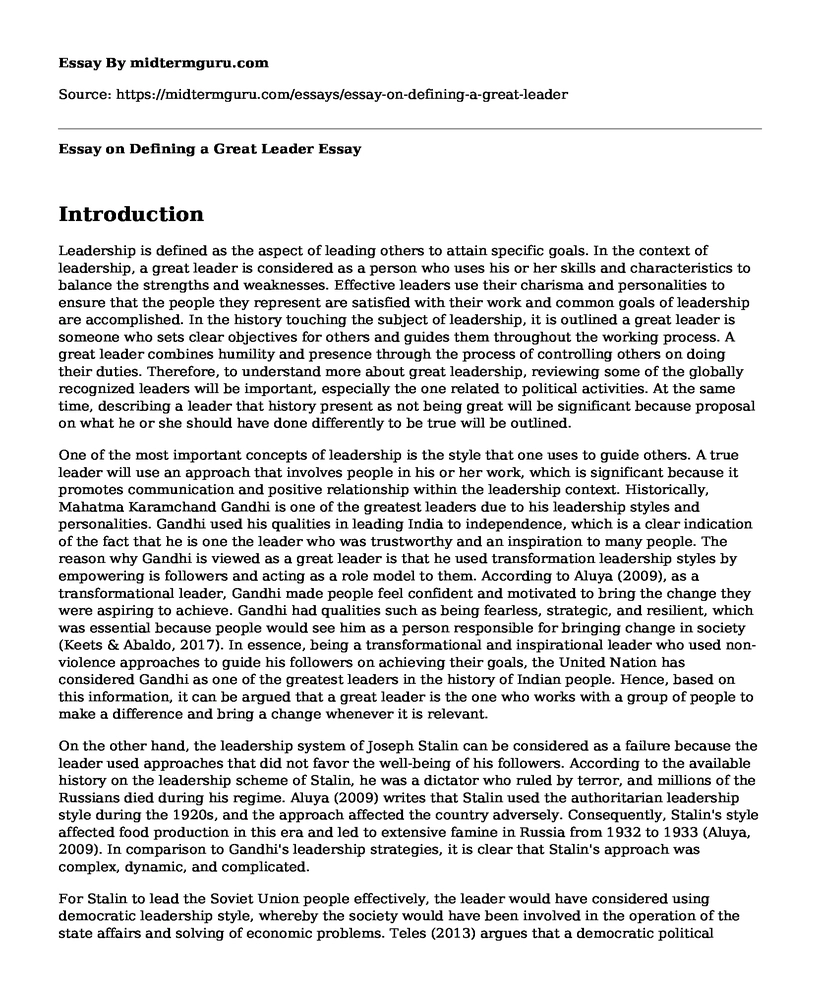Introduction
Leadership is defined as the aspect of leading others to attain specific goals. In the context of leadership, a great leader is considered as a person who uses his or her skills and characteristics to balance the strengths and weaknesses. Effective leaders use their charisma and personalities to ensure that the people they represent are satisfied with their work and common goals of leadership are accomplished. In the history touching the subject of leadership, it is outlined a great leader is someone who sets clear objectives for others and guides them throughout the working process. A great leader combines humility and presence through the process of controlling others on doing their duties. Therefore, to understand more about great leadership, reviewing some of the globally recognized leaders will be important, especially the one related to political activities. At the same time, describing a leader that history present as not being great will be significant because proposal on what he or she should have done differently to be true will be outlined.
One of the most important concepts of leadership is the style that one uses to guide others. A true leader will use an approach that involves people in his or her work, which is significant because it promotes communication and positive relationship within the leadership context. Historically, Mahatma Karamchand Gandhi is one of the greatest leaders due to his leadership styles and personalities. Gandhi used his qualities in leading India to independence, which is a clear indication of the fact that he is one the leader who was trustworthy and an inspiration to many people. The reason why Gandhi is viewed as a great leader is that he used transformation leadership styles by empowering is followers and acting as a role model to them. According to Aluya (2009), as a transformational leader, Gandhi made people feel confident and motivated to bring the change they were aspiring to achieve. Gandhi had qualities such as being fearless, strategic, and resilient, which was essential because people would see him as a person responsible for bringing change in society (Keets & Abaldo, 2017). In essence, being a transformational and inspirational leader who used non-violence approaches to guide his followers on achieving their goals, the United Nation has considered Gandhi as one of the greatest leaders in the history of Indian people. Hence, based on this information, it can be argued that a great leader is the one who works with a group of people to make a difference and bring a change whenever it is relevant.
On the other hand, the leadership system of Joseph Stalin can be considered as a failure because the leader used approaches that did not favor the well-being of his followers. According to the available history on the leadership scheme of Stalin, he was a dictator who ruled by terror, and millions of the Russians died during his regime. Aluya (2009) writes that Stalin used the authoritarian leadership style during the 1920s, and the approach affected the country adversely. Consequently, Stalin's style affected food production in this era and led to extensive famine in Russia from 1932 to 1933 (Aluya, 2009). In comparison to Gandhi's leadership strategies, it is clear that Stalin's approach was complex, dynamic, and complicated.
For Stalin to lead the Soviet Union people effectively, the leader would have considered using democratic leadership style, whereby the society would have been involved in the operation of the state affairs and solving of economic problems. Teles (2013) argues that a democratic political leader bases his or her leadership on shared principles, which is important in improving coordination in a state, generating policies through negotiation, and working in partnership with public authorities and private organizations. Thus, if Stalin used this approach, the Union Soviet would not have been exposed to a great terror regime, as both leaders and followers would have contributed to the country's ruling.
References
Aluya, J. (2009). Complexity of leadership, organizations and the real estate industry: Disrupting existing systems. AuthorHouse.
Keets, J., & Abaldo, A. (2017). Servant Leadership: Learning from Servant Leaders of the Past and Their Impact to the Future. International Journal of Management Sciences and Business Research, 6(1), 53-57.
Teles, F. (2015). The distinctiveness of democratic political leadership. Political Studies Review, 13(1), 22-36.
Cite this page
Essay on Defining a Great Leader. (2022, Sep 19). Retrieved from https://midtermguru.com/essays/essay-on-defining-a-great-leader
If you are the original author of this essay and no longer wish to have it published on the midtermguru.com website, please click below to request its removal:
- The Life of James Madison - 4th President of the United States
- Essay on the United States of America as the Largest Source of Foreign Aid and Humanitarian Assistance
- Essay on Promoting Health Quality in Organization Culture
- Group Discussion Analysis
- Paper Example on Ethnic Relations, Political Centralization and Territorial Control of China
- Essay Sample On Behavior, Perspective, and Advice on Leadership
- Project Managers' Teamwork Competencies - Research Paper







